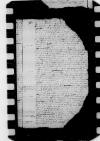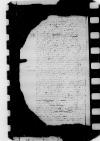List #2370
[Ioannes DANTISCUS] do [Samuel MACIEJOWSKI]Heilsberg (Lidzbark Warmiński), 1541-07-19
Regest polski:
Dantyszek obszernie odpisał na list Maciejowskiego z trzeciego czerwca, odnosząc się do obrad ostatniego sejmu pruskiego na temat podatku. List ów przekazał za pośrednictwem siostrzeńca [Simona Hannaua]. O ile sprawy ułożą się zgodnie z tym, co wówczas napisał, jest pełen nadziei.
Wprawdzie nie ze względu na na dobro państwa, lecz na aktualną sytuację, Dantyszek pochwala zaakceptowanie opinii panów pruskich w kwestiach monety i apelacji. Cieszy się zatem, że jego własna opinia nie została przyjęta, usatysfakcjonowała go jednak sama możliwość wyrażenia [przez nią] wierności władcy. Więcej na ten adresat dowie się z załączonego dopisku.
Wyraża wdzięczność za przysługi wyświadczane przez Maciejowskiego mieszkańcom Prus Królewskich. Zawstydza go myśl, że on sam jest inicjatorem tak wielkiego trudu, który nie przynosi Maciejowskiemu odpowiednio obfitych owoców.
Cieszy się, że mimo sprzeciwu dworu, monarcha docenił adresata powierzając mu biskupstwo płockie. Wierzy, że wrogowie dobrych ludzi nie unikną zasłużonej kary.
Podziela opinię Maciejowskiego, że proskrybowany Aleksander [Sculteti] zmierza ku zatraceniu. Wolałby, by Aleksander się opamietał, porzucił bezbożność i podburzanie ludzi, lecz ten uporczywie dąży do własnej zguby. Spotka go niechybnie zasłużony los, o ile w Rzymie pozostało jeszcze choć trochę pobożności.
Dantyszek dziękuje za edykty królewskie. Dotarły one w odpowiedniej chwili, ponieważ niespodziewanie z Rzymu przybył wspólnik proskrybowanego, Dietrich von Rheden, którego listy były w [przeszukanej] skrzynce Aleksandra. Rheden zatrzymał się w Królewcu i jako kanonik warmiński planował nawiedzić katedrę [we Fromborku], zniechęciła go jednak pogłoska o edyktach. Dantyszek z oburzeniem konstatuje, że Rheden, mimo iż jest kanonikiem, zwrócił się o pomoc dla proskrybowanego do [luterańskiego] księcia [Albrechta Hohenzollerna].
Edykty zostały ogłoszone przez wojewodów w całych Prusach Królewskich. Zlekceważył je jedynie wojewoda chełmiński [Jan Luzjański], który nie wywiązuje się również ze swoich obowiązków sądowniczych, mimo że na podlegającym mu terenie popełniane są liczne zabójstwa. W jednym z incydentów uczestniczył między innymi dworzanin królewski Jabłonowski. Dantyszek nie wątpi, że skargi na tę sytuację dotarły już wcześniej do króla. Sugeruje, aby władca wysłał wojewodzie napomnienie, choćby za pośrednictwem polecanego ostatnio Maciejowskiemu przez Dantyszka syna sędziego chełmińskiego [Jerzego Plemięckiego]. Jeżeli na urząd wojewody chełmińskiego nie zostanie wyznaczona osoba bardziej energiczna, Dantyszek przewiduje nieuchronne zamieszki, ponieważ, wskutek opieszałości obecnego wojewody, Prusy stale doświadczają najazdów z Mazowsza i ziemi dobrzyńskiej.
Dantyszek poczuł się zawstydzony podziękowaniami za podarek, zawartymi w liście Maciejowskiego z 16 czerwca. Pragnąłby, aby dar ten był większy i godniejszy.
Dziękuje za przedłużenie listu żelaznego dla doręczyciela niniejszego listu, Hansa Holstena. Zapewne nie zdoła on odwdzięczyć się w stosowny sposób, ponieważ procesy bardzo go zubożyły, Dantyszek liczy jednak na wsparcie Maciejowskiego dla Holstena w procesie o spadek. Zaświadcza, że w podobnej sprawie między gdańszczanami strony zostały skłonione do zawarcia ugody, jak to zwykło się czynić, gdy strony powołują się na sprzeczne prawa. Holstenowi sprzyja pisane prawo magdeburskie, stronie przeciwnej zaś – zwyczajowe prawo chełmińskie. Wprawdzie podjęte zostały prace nad przywróceniem dawnego prawa [chełmińskiego], lecz nie zakończą się one szybko, toteż Dantyszek uważałby za sprawiedliwe przymuszenie stron do zawarcia ugody na dworze. Pragnie, by Maciejowski nakłonił króla do wydania takiego rozkazu. Sygnalizuje również, że Holsten sam przedstawi Maciejowskiemu sprawę, którą ma z Radą Miasta Gdańska. Prosi też Maciejowskiego o przedłużenie listu żelaznego dla Holstena do czasu całkowitego uwolnienia go od zarzutów przez Radę [Pruską] .
Dziękuje za powierzenie urzędu burgrabiego [gdańskiego] Iohannowi Stutte, a także za przesłanie biskupowi chełmińskiemu [Tiedemannowi Giese] dokumentu ogłoszenia [testamentu].
Informuje, że [Gulielmus] Gnapheus podobno przeniósł się z Elbląga do Królewca. Uważa, że jeżeli Gnapheus założy tam szkołę, potrzebny będzie mandat królewski, by zapobiec napływowi do niej mieszkańców Prus Królewskich.
Dziękuje za list królewski, który przekazał Wolfgangowi Folderowi i jego małżonce Barbarze wraz z własnym listem do Rady Gdańska, zawierającym zalecenia w sprawie ogłoszenia wyroku. Spodziewa się, że sprawa zostanie bezpiecznie doprowadzona do końca.
Dantyszek cieszy się, że król, pod wpływem adresata, nie zganił jego starań w sprawie podatku. Obiecuje kontynuować te starania, pragnąłby jednak mieć taką swobodę przybywania i oddalania się, jaką mają wojewodowie i inni urzędnicy Rady [Pruskiej].
Dantyszek wyraża zadowolenie z przekazania przez Maciejowskiego prebendy w Gołąbiu [Stanisławowi] Hozjuszowi.
Załącznik:
Dantyszek usprawiedliwia obszerność swoich listów do Maciejowskiego wagą i obfitością problemów, jakie musi rozwiązywać sprawując funkcję prezydenta Senatu i Rady [Pruskiej].
Wobec daremności wielokrotnego upominania księcia [Albrechta Hohenzollerna], opinia Dantyszka o monecie poskutkowała jedynie tym, że zarówno w Królestwie, jak i w Prusach wszyscy uświadomili sobie, iż wkrótce złoty węgierski będzie wart [zaledwie] 50 groszy. W związku z tym spadają ceny, toteż wkrótce książę nie będzie miał pożytku z obfitości wybitych monet, ponieważ dochody skarbowe realnie się obniżą. Miasta [Prus Królewskich], widząć, że ponad pięćdziesięciu mincerzy codziennie wybija dla księcia wielkie ilości monet z brązu i srebra, uznały, że również i one mogą znów uruchomić swoje mennice. Dantyszek nie widzi innej drogi, by zmusić księcia do rezygnacj z tego procederu, niż groźba utraty lenna, nalega jednak na zachowanie w tajemnicy, że sugestia ta wyszła od niego.
Dantyszek pragnie znać odpowiedzi, udzielone przez księcia w dotyczących go sprawach, zwłaszcza zaś co do kwestii apelacji. Uważa, że skoro poddani z Prus Królewskich nie mogą odwoływać się od wyroków książęcych, poddanym Albrechta również nie powinien przysługiwać przywilej apelacji od wyroków wydanych przez sądy Prus Królewskich. Przypomina, iż w traktacie krakowskim między królem a księciem [wówczas, w 1525 r., wielkim mistrzem Zakonu Krzyżackiego] zastrzega się, że panowie Rady [Królestwa] i komisarze [księcia] mogą być powoływani i spotykać się wyłącznie w sprawach dotyczących osoby księcia. O sprawach osób prywatnych nie ma wzmianki. Przepisy te nie zmieniły się od czasów Zakonu.
O ile Bartolomeus Vogt zwróci się o wyznaczenie komisarzy w wielokrotnie przegranej przez siebie sprawie spadku po zbiegłym kapłanie [Georgu Langerbeinie], którą zgodnie z prawem rozpatrywał Dantyszek, należy odrzucić jego żądania.
Dantyszek prosi o pouczenie, jakimi zgodnymi z wolą królewską sposobami ma skłonić uczestników zbliżającego się sejmu [pruskiego] do uchwalenia podatków. Deklaruje gotowość do powiększania dochodów władcy i zaleca mu oraz adresatowi swoją osobę.
Prosi o życzliwe przyjęcie pieniędzy, obiecanych jako dowód wdzięczności mieszkańców Prus (nostratium) dla adresata, pomimo że ekspediowane są z opóźnieniem i partiami – obecnie przesyła kwotę, przekazaną przez wojewodę pomorskiego [Jerzego Konopackiego].
Pewni radcy pruscy [Jerzy Bażyński] poinformowali Dantyszka, że starosta rogoziński [Jan Sokołowski] wyruszył na dwór królewski, by objąć w posiadanie zamek i dobra starostwa po śmierci żony [Hanny Czernej], wdowy po poprzednim staroście, Lukaszu von Allen (Mełdzyńskim). Ponieważ Sokołowski nie tylko nie jest pruskim indygeną, lecz także sprzeciwia się wszystkim pruskim prawom i zwyczajom, Dantyszek, na prośbę swoich informatorów, w sekrecie prosi Maciejowskiego, by ten zatroszczył się o prawa mieszkańców Prus oraz by wysondował, czy królowa [Bona Sforza] byłaby skłonna zgodzić się na odkupienie zamku wraz ze starostwem przez kasztelana gdańskiego [Achacego Cemę]. Cema obiecuje zapisać dodatkowo na zamku na rzecz królowej prawie 6 tys. florenów, a jeżeli rzecz się powiedzie, przeznacza 100 florenów w podzięce dla Maciejowskiego.
Biskup chełmiński [Tiedemann Giese] zwrócił uwagę na brak podpisu królewskiego na wystawionym przez kancelarię dokumencie ogłoszenia [testamentu], pomimo informacji w tekście dokumentu o takim podpisie. Prosi o powtórne jego wystawienie z podpisem lub bez wzmianki o nim w treści. Dantyszek załącza kopię wadliwego dokumentu na wypadek, gdyby adresat nie miał kopii kancelaryjnej.
Informuje, że ostatnio gdańszczanie zaniechali uroczystej celebracji święta Bożego Ciała. Rzemieślnicy wedle zwyczaju byli gotowi stawić się z chorągwiami, rada miejska wydała jednak zakaz. Jedynie proboszcz ze swoimi ludźmi poprowadził procesję w kościele. Dantyszek obawia się, że Gdańsk czerpie wzorce z Królewca, i wróży rozprzestrzenianie się pożaru [herezji], o ile władcy [Polski] nie postawią mu tamy.
Rękopiśmienne podstawy źródłowe:
Pomocnicze podstawy źródłowe:
| ||||||||||
Tekst + aparat krytyczny + komentarzZwykły tekstTekst + komentarzTekst + aparat krytyczny
Reverendissime in Christo Pater et Domine, frater et amice carissime ac paper damaged⌈[rater et amice carissime ac]rater et amice carissime ac paper damaged⌉ honorande.
Salutem et obsequiorum meorum commendationem paper damaged⌈[meorum commendationem]meorum commendationem paper damaged⌉.
Ad cf.
Quod consilium
De ma paper damaged⌈[ma]ma paper damaged⌉gna hac nostra gratitudine adeo uberes mihi gratiae non debentur paper damaged⌈[ntur]ntur paper damaged⌉. Debemus enim hic omnes, si omnes beneficium acceptum sentiremus written over nt⌈ntmusmus written over nt⌉, longe ma paper damaged⌈[a]a paper damaged⌉iora Dominationi Vestrae Reverendissimae, porro vetus est adagium: „Qui benefacit plurimis, benefecisse videtur nulli”. Ego quidem pudefio cum reputans written over o⌈oansans written over o⌉ suscepti pro nobis hic laboris Dominationi Vestrae Reverendissimae fuisse me auctorem, ... illegible⌈...... illegible⌉ quod fructus sementi non responderint.
Quantum me exhilaraverit, quod serenissima
Proscriptus
Commodum huc edicta paper damaged⌈[ta]ta paper damaged⌉ regia fuerunt allata on the margin⌈fuerunt allatafuerunt allata on the margin⌉, pro quibus impense ago gratias fuerunt allata, cum praeter paper damaged⌈[er]er paper damaged⌉ spem ex
Haec omnia
Edicta regia per  BCz, 245, p. 264 [...] paper damaged⌈[...][...] paper damaged⌉eden(n) oppido ... illegible⌈...... illegible⌉ [...] paper damaged⌈[...][...] paper damaged⌉ castro [...] paper damaged⌈[...][...] paper damaged⌉ geruntur(?) [...] paper damaged⌈[...][...] paper damaged⌉ ho paper damaged⌈[ho]ho paper damaged⌉micidia non pauca commissa, quibus ille(?) causam dediss[...] hidden by binding⌈[...][...] hidden by binding⌉ [...] paper damaged⌈[...][...] paper damaged⌉ inibi(?)
BCz, 245, p. 264 [...] paper damaged⌈[...][...] paper damaged⌉eden(n) oppido ... illegible⌈...... illegible⌉ [...] paper damaged⌈[...][...] paper damaged⌉ castro [...] paper damaged⌈[...][...] paper damaged⌉ geruntur(?) [...] paper damaged⌈[...][...] paper damaged⌉ ho paper damaged⌈[ho]ho paper damaged⌉micidia non pauca commissa, quibus ille(?) causam dediss[...] hidden by binding⌈[...][...] hidden by binding⌉ [...] paper damaged⌈[...][...] paper damaged⌉ inibi(?)
In cf.
Pro salvi hidden by binding⌈[i]i hidden by binding⌉ conductus prorogatione
Burgrabiatum domino
Quod serenissima maiestas regia superinscribed⌈serenissima
Meminisse Dominatio Vestra Reverendissima in assecutione
Ex
Reverendissime mi paper damaged⌈[Reverendissime mi]Reverendissime mi paper damaged⌉ Domine.
Quod [...] on the margin⌈[...] paper damaged⌈[...][...] paper damaged⌉[...] on the margin⌉ litteris(?) [...] paper damaged⌈[...][...] paper damaged⌉ multa lectione Dominationi Vestrae Reverendissimae [...] paper damaged⌈[...][...] paper damaged⌉s molestiam, non velit ferre aegrius, quam written over uum⌈uumuamuam written over uum⌉ rerum, de quibus paper damaged⌈[quibus]quibus paper damaged⌉ scribitur, necessitas postulat. Ad me, ut huius hic nostri senatus et paper damaged⌈[natus et]natus et paper damaged⌉ consilii praesidentem, omnes negotiorum tumultus devolvuntur. In quibus non licet, ut libenter velim ... illegible⌈...... illegible⌉, si omnia expl<i>cari debent, agere Laconice.
Consilium meum de moneta pro modulo(?), cum iam superinscribed in place of crossed-out iam toties⌈iam toties iam iam superinscribed in place of crossed-out iam toties⌉ iteratis vicibus ill(ustrissimus) or ill(ustris)⌈ill(ustrissimus)ill(ustrissimus) or ill(ustris)⌉ dominus
Si quid Dominatio Vestra Reverendissima domino
Proinde si
cf.
D[...] paper damaged⌈[...][...] paper damaged⌉ [...] paper damaged⌈[...][...] paper damaged⌉
Addidi iis litteras superinscribed⌈cf.
cf.
ms 1 q[ui] paper damaged⌈quims 2 qui,
ms 1 q[ui] paper damaged⌉
ms 2 adversatur et consuetudinibus⌈et consuetudinibus on the margin⌈et consuetudinibuset consuetudinibus on the margin⌉ adversaturms 1 et consuetudinibus adversatur,
ms 2 adversatur et consuetudinibus⌉, gravissimum videtur. ms 1 Rogarunt,
ms 2 Rogaverunt⌈Rogaruntms 1 Rogarunt,
ms 2 Rogaverunt⌉ idcirco me, ut secreto cum Dominatione Vestra Reverendissima agerem, si quo pacto ab ista ambitione ille superinscribed⌈illeille superinscribed⌉ protrudi ms 1 possit,
ms 2 posset⌈possit superinscribed⌈possitpossit superinscribed⌉ms 1 possit,
ms 2 posset⌉, ms 1 ut,
ms 2 et⌈utms 1 ut,
ms 2 et⌉ nos in privilegiis nostris salvi manere possimus maneamus, utque rem plane capiat, generosus superinscribed⌈generosusgenerosus superinscribed⌉ dominus
Non possum committere, quin addam
XIX Iulii MDXLI paper damaged⌈[LI]LI paper damaged⌉.
[1] arcula of
[2, 4] Probably
[3] Cf. Instrumentum pacis et concordiae inter Sigismundum regem ac regnum Poloniae et Albertum magistrum generalem Ordinis Cruciferorum in Prussia ducem creatum regni Poloniae feudatarium a quibusdam principibus mediatoribus compositae (cf. Corpus Iuris Polonici sectionis primae privilegia statuta constitutiones edicta decreta mandata regnum Poloniae spectantia comprehendentes voluminis quarti annos 1523-1534 continentis fasciculus primus, ed. by Oswald Balzer, Kraków, 1910 ⌊CIP 1/4/1cf. Corpus Iuris Polonici sectionis primae privilegia statuta constitutiones edicta decreta mandata regnum Poloniae spectantia comprehendentes voluminis quarti annos 1523-1534 continentis fasciculus primus, ed. by Oswald Balzer, Kraków, 1910 ⌋, p. 155).



